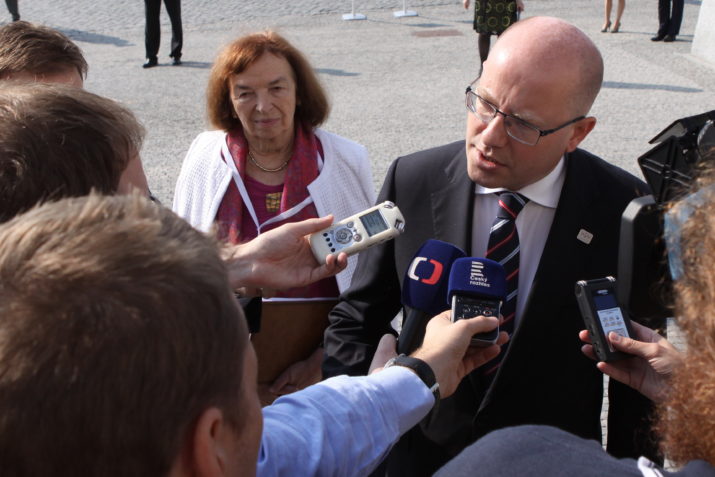
Similar to most of the 27 EU member states, the Czech government’s attitude towards Brexit has been fairly uncompromising. Tomáš Prouza, the Czech government minister for EU affairs, has been rather critical towards Theresa May and her position on Brexit as it has developed in recent months. For instance, in late February, the Czech minister expressed the anger of the EU nations over Downing Street’s suggestion to divert a part of the UK aid budget to eastern European countries in order to bribe them to give Britain a good trade deal.1 “The benefits go to the UK only,” said Tomáš Prouza, the Czech minister for EU affairs. “There is a real danger that British politics, with all its whipped up resentments of Europe, will mean British negotiators are unable to compromise, and we will head for a crash-landing.” In January of this year, Prouza tweeted: “UK’s plan seems a bit ambitious. Trade as free as possible, full control on immigration… where is the give for all the take?” 2
The hard line of the Czech government towards Brexit is in line with the prevailing European belief that Brexit will be a self-inflicted disaster for the United Kingdom. While the Czechs as members of a ten million nation know very well their international influence would be greatly diminished if the EU ceased to exist, their dissatisfaction of what they increasingly see as a position of second rate citizens within the EU could in future become a deeply destabilizing factor.
Paradoxically, it was the pro-European Social Democratic Prime Minister, Bohuslav Sobotka, who seems to have unwittingly drawn the attention of the Czechs to the fact that almost thirty years after the fall of communism, their salaries and wages still remain extremely low. Sobotka has inadvertently created a strong wave of public dissatisfaction with what the Czechs see as their poverty within the EU. Many of them blame the European Union for this.
Sobotka’s Czech Social Democrats are currently part of a ruling coalition with the right-of-center “Ano” “(“Yes”) party, which is run by a Berlusconi-like oligarch Andrej Babiš, Czech Deputy PM and Finance Secretary, who owns substantial holdings in the Czech food industry and also controls some important Czech media outlets. Remarkably, Babiš’s party is now supported by more than 30 percent of the Czech voters, while the Social Democrats are supported only by 20 percent.3 It is quite likely that the Social Democrats will be the losers in the forthcoming general election, which is due to take place in October 2017.
In an attempt to improve the electoral chances of the Social Democrats, the Czech PM Sobotka has decided to propose re-introducing progressive taxation in the Czech Republic. As in several other East European countries,4 progressive taxation was replaced by flat tax5 in the Czech Republic in 2008.
Sobotka has pointed out that only 9 percent of Czech employees earn more than 50,000 crowns (USD 1965) per month before tax. He has proposed to raise the income tax for those 9 percent and to lower the income tax for the remaining 91 percent.
His proposal has immediately become the target of sharp criticism in the media. Cynics might say that this is because most of the media pundits belong to the “rich” 9 percent of the Czech employees and would thus be adversely affected by the income tax rise.
The problem, however, is that due to fairly high levels of other deductions, the gross income of 50,000 crowns per month is actually only 36,000 crowns (USD 1415) per month net, as was pointed out by Petr Honzejk,6 a commentator on the Prague economic newspaper Hospodářské noviny. Which is not a particularly astronomical pay. It became the subject of public attention that most of the so-called “rich” people in the Czech Republic earn only around 1,400 US dollars per month net.
But what was particularly alarming for the Czechs was the realization that the overwhelming majority of Czech employees earn an absolute minimum. As the graph below shows, in the Czech Republic, a country with 3.7 million employees,7 630,000 employees (17 per cent) earn less than 15,000 crowns (USD 590) per month, 800,000 (22 per cent) of them earn less than 20,000 crowns (USD 786) per month and 1.1 million (30 per cent) earn less than 25,000 crowns (USD 982) per month. All these sums are before tax:

The sudden realization,8 as a result of public debate, that only some 30 percent of Czech employees earn more than about 1,000 USD per month before tax, was absolutely horrifying for most Czechs. As can be seen from Eurostat statistics, the Czech Republic belongs to the group of those EU countries that have minimal labor costs and hence the smallest wages.9
While some local goods and services are cheaper than their equivalents in the West, most industrial products are of the same price as in the West.
But this is not what was promised to the Czech population in the heady, optimistic period in the early 1990s, immediately after the fall of communism. The Czechs were told that they would quickly enter the land of milk and honey and would become just as affluent as the neighboring (West) Germans, with whom they constantly compare themselves.
The realization of “how poor we all are” seems all the more frustrating to the Czechs since an opinion poll has shown recently that many of them are not particularly interested in democracy, what they are interested in is affluence. According to a CVVM opinion poll conducted in February 2016, only 50 percent of Czech adults think that democracy is the best method of government.10
The public debate on the topic of the general poverty of the Czechs, which followed in the Czech media and on the social networks after Sobotka’s announcement made the Czechs realize that, as they see it, they are second class citizens in the European Union and will always remain so.
According to Eurostat, the Czech Republic has the smallest levels of people who are threatened by poverty, i.e. 9.5 percent11 and along with Slovakia, it has the smallest inequality of income distribution12 of all the member states of the European Union (although it has one of the largest gender pay gaps in Europe at 22 percent).13 But many critics in the Czech Republic reject these statistics, pointing out that the Eurostat data is calculated on the basis of a median income, weighted according to local “consumption patterns.” But the Czech median income is, in their view, very low in the Czech Republic and the local “consumption patterns” are questionable. As one commentator put it:
“In Germany, the average age of a private car is about 8-9 years. In the Czech Republic, it is 15 years and growing. My German colleague who does the same type of work as me, can buy a new car every ten years and after ten years, he can sell it as a second hand car. I can afford to buy, once every ten years, a second hand car for half the German price and will have to pray that it does not break down and that I will be able to repair it if it does break down. So these are the typical ‘consumption patterns’ on which these statistical assessments are based: a German can buy a new car every ten years and I can buy a second hand car every ten years.” 14
What are the reasons for this state of affairs? Many people complain that the Czech Republic is a “paradise” for the multinational companies who pay almost no taxes in the country and repatriate USD $14-17 billion of profits from the Czech Republic annually.15 “Half of that amount would solve most of the social problems in the Czech Republic.” Repatriation of profits abroad is possible, critics say, because successive Czech governments have been in cahoots with influential entrepreneurs and multinational companies at the expense of ordinary employees. Others point to the fact that trade unions are extremely weak in the Czech Republic and that the Czechs almost never strike demanding an increase in pay. Yet others argue that since the fall of communism in 1989, successive Czech governments never tried to push through an economic policy based on industrial innovation and have turned the country into a giant assembly hall of products made abroad, mostly in Germany.16 The resulting low levels of pay are a source of wholesale frustration in the country and a potentially major destabilizing factor.
There is a serious danger that with advancing automation and the growing impact of artificial intelligence on employment and on industrial processes, income levels in the Czech Republic will drop even further.17 At the moment, the country has no strategy on how to tackle this threatening problem.
Needless to say, in the other post-communist EU member states, this situation is even worse, therefore the Czechs can perhaps say, “we are poor, but not as poor as…”
Jan Čulík is a journalist and academic who holds the position of Senior Lecturer in Czech Studies at the University of Glasgow, Scotland. He is the author of several publications in this field, including the first detailed study of Czech emigré literature, Books behind the Fence: Czech Literature in Émigré Publishing Houses 1971-1989, and a study of the value system of Czech feature film made in the post-communist era (A Society in Distress: The Image of the Czech Republic in Contemporary Czech Feature Film. Sussex Academic Press, London and Brighton, 2012). His most recent publication, in cooperation with six other international scholars, is a monograph entitled National Mythologies in Central European TV Series How J.R. won the Cold War, Sussex Academic Press, 2013.
Photo: Czech Republic, Mr. Bohuslav Sobotka, Prime Minister | Shutterstock
References:
1 Daniel Boffey, Dan Roberts and Jon Henley, “Divide and rule tactics could leave UK without deal, say EU politicians”. The Guardian, 20th February, 2017. https://www.theguardian.com/uk-news/2017/feb/20/divide-and-rule-tactics-could-leave-uk-without-deal-say-eu-politicians
2 Anushka Asthana, Heather Stewart and Jessica Elgot, “Brexit: May’s threat to Europe: ‘no deal for Britain is better than a bad deal’”. The Guardian, 18th January, 2017. https://www.theguardian.com/politics/2017/jan/17/prime-minister-vows-to-put-final-brexit-deal-before-parliament
3 “Volby by vyhrálo ANO, komunisté ztrácejí”. Novinky.cz, 27th February, 2017. https://www.novinky.cz/domaci/430569-volby-by-vyhralo-ano-komuniste-ztraceji.html
4 Czech Prime Minister Bohuslav Sobotka’s tweet, 22nd February 2017: “As this maps shows nicely, a majority of EU countries use progressive taxation. For the sake of justice and cohesion. 21 EU countries use progressive taxation.” https://twitter.com/SlavekSobotka/status/834451701553848320
5 Rovná daň v Česku (Flat tax in the Czech Republic). Wikipedia. https://cs.wikipedia.org/wiki/Rovn%C3%A1_da%C5%88#Rovn.C3.A1_da.C5.88_v.C2.A0.C4.8Cesku
6 Petr Honzejk, “Pane Sobotko, bohatí vypadají jinak!” Hospodářské noviny, 23rd February, 2017. http://archiv.ihned.cz/c1-65634820-pane-sobotko-bohati-vypadaji-jinak
7 Počet zaměstnanců a průměrné hrubé mzdy podle CZ-NACE / The number of employees and average gross monthly wages by CZ-NACE: Czech Statistical Office. 24th November, 2014. https://www.czso.cz/documents/10180/20552281/11002414q341.pdf/ce4980e2-7e25-4407-855c-5381752d3e44?version=1.1
8 Stanislav Biler, “Češi prozřeli: Všichni jsme chudí”. Hospodářské noviny, 24th February, 2017. http://nazory.ihned.cz/komentare/c1-65636990-cesi-prozreli-vsichni-jsme-chudi
9 Estimated hourly labour costs, 2015. Eurostat. http://ec.europa.eu/eurostat/statistics-explained/images/e/ed/Estimated_hourly_labour_costs%2C_2015_(EUR)_V4.png
10 Názory občanů na fungování demokracie a na lidská práva. Centrum pro výzkum veřejného mínění, Sociologický ústav AV ČR. February 2016. http://cvvm.soc.cas.cz/media/com_form2content/documents/c1/a7526/f3/pd160318.pdf
11 At-risk-of-poverty rate and threshold, 2015. Eurostat. http://ec.europa.eu/eurostat/statistics-explained/index.php/File:At-risk-of-poverty_rate_and_threshold,_2015_YB17.png
12 Inequality of income distribution, 2015. Eurostat. http://ec.europa.eu/eurostat/statistics-explained/index.php/File:Inequality_of_income_distribution,_2015_(income_quintile_share_ratio)_YB17.png
13 Low-wage earners — employees (excluding apprentices) earning less than two thirds of the median gross hourly earnings, 2014 (% of employees). Eurostat. http://ec.europa.eu/eurostat/statistics-explained/index.php/File:Low-wage_earners_%E2%80%94_employees_(excluding_apprentices)_earning_less_than_two_thirds_of_the_median_gross_hourly_earnings,_2014_(%25_of_employees)_V2.png
14 Pavel Erben, “Jsou Češi chudí, anebo třou bídu?” Britské listy, 27th February, 2017. http://blisty.cz/art/85886.html
15 Marek Beneš, “Uprchlíci jsou důležitější než novorozenci dýchající benzopyren v Radvanicích?” Britské listy, 21st February, 2017. http://blisty.cz/art/85803.html
16 Karel Dolejší, “V ČR jsou mizerné platy, protože lidé volí sociální demokracii.” Britské listy, 1st March, 2017. http://blisty.cz/art/85909.html
17 Bohumil Kartous, “Češi chudí teprve budou, a brzy… “ Britské listy, 2nd March, 2017. http://blisty.cz/art/85913.html
Published on April 19, 2017.




